Institutional Context
Summary
Founded on civic university principles, and with an emphasis on improving social mobility, the University of Suffolk is all about transformation – transforming individuals, our community, our region and beyond. We have absorbed the best traditions in higher education and aligned them with the modern world of employment and entrepreneurship. We are a young, distinctive, thriving academic community making a clear and immediate impact. Our purpose is to change lives for the better– of individuals and the communities we serve.
In a world where nothing ever stays the same, we all need to change, evolve, succeed and change again. That’s what we do.
(102)
Institutional context
Our vision is that by 2030 we will be recognised as an empowering force for individual and community growth and development. We will be recognised for the major contribution we make to the health and wellbeing of the people in our region and acknowledged for lasting social and sustainable economic transformation.
Our most recent economic impact assessment showed that every £1 spent generated £9 of impact (including long-term impact).

A community partnership approach underpins and informs our learning and teaching, research and knowledge exchange, ensuring an in-depth and current understanding of the economic landscape. This can be further evidenced by the University’s appointment of a Pro Vice-Chancellor of Business and Entrepreneurship in 2020, significant investment into a new directorate focussed on knowledge exchange and business and community engagement, and further investment into our areas of distinctiveness with the appointment of Professorial staff and Research Institute leaders in 2021.
As one of four key institutional strategies, in 2018 we published our first business engagement strategy which was updated in 2021 following the creation of the new Business Engagement Careers and Employability Directorate (BECE). The team focuses on four pillars: Alumni Relations and Development, Careers, Employability and Enterprise, Business Development and Knowledge Exchange and Apprenticeships. This demonstrates our commitment to grow our external engagement, knowledge exchange activity and our subsequent impact.

BECE supports the University’s mission to:
“...be one of the key business support agencies in the region and the provider of choice for knowledge exchange, innovation, and entrepreneurship, and state-of-the-art training for our region. We aim to regenerate our local economy by transforming local productivity and targeted sectors, through skills and workforce development.”
And ensure: “...Our graduates will be confident thinkers and professionals ready for the world of work. They will have the breadth of knowledge and experience required; they will be socially conscious and value-driven individuals striving to make a positive contribution to society. In a technologically driven world, our graduates will be digitally competent, globally aware, forward looking, enterprising, enquiring and a voice of change for our future sustainable development.”
In response to the identified needs of our local community and local economic plans, we developed specific areas of distinctiveness and established corresponding Research Institutes. Professors/Directors and other key staff were recruited, and the Institutes launched in 2021-22:
Health and Wellbeing
Crime and Social Justice,
Digital Futures
Sustainability
In addition, we established the Integrated Care Academy (ICA), the
first of its kind, a partnership between the University, the Suffolk and
North-East Essex Integrated Care System, Suffolk County Council,
Healthwatch Suffolk and the voluntary and community sector, including
Suffolk Mind.
The ICA is the leading academic partner for local health and social care
services focussing on mental health, living well into old age and end of
life care. Education, workforce development, leadership, innovation and
research are key and the partnership has already delivered significant
impact.
All knowledge exchange is underpinned by a commitment to cross cutting themes including leadership and management, equality and diversity and sustainability.
For further information, please send queries to engage@uos.ac.uk
Local Growth and Regeneration
Summary of approach
Local growth and regeneration are pivotal to our university mission. We have invested in 4 areas of distinctiveness, aligned to regional/national priorities and key strengths, and made significant investment into the Business Engagement, Careers and Employability Directorate. We play a vital role in the physical regeneration of Ipswich, and beyond, and in regional organisation growth.
We aim to:
Transform local productivity and targeted sectors through skills development, business growth and job creation, work-based learning, student and graduate entrepreneurship and support for research and innovation
Be the provider of choice for knowledge exchange, innovation, and entrepreneurship, and state-of-the-art training for our region. We aim to regenerate our local economy by transforming local productivity and targeted sectors, through skills and workforce development
Aspect 1: Strategy
Key Drivers
The University of Suffolk aims to increase its local growth and regeneration activity to significantly impact on the local priorities of enhancing productivity through workforce development and research and innovation. Striving to be one of the key regional business support providers underpins thinking in much of our sector focused work and strategies, including learning and teaching, research and business development and knowledge exchange. This includes capital projects which deliver state-of-the-art facilities to the County. Another key area of growth is our apprenticeship provision, which provides quality teaching to meet business need.
As a relatively new, small institution we understand the importance of developing partnerships to attract larger grants and build our track record and this has informed our strategic approach.
Geography
Whilst hyper-local growth and regeneration remains of significant importance to the university, the geographical focus of activity during this period was expanded to correspond to the significant Directorate growth and available funding opportunities. We built strategic networks with organisations with knowledge of regional need and expertise that complemented our strengths. This resulted in successful proposals to co-deliver large initiatives supporting business growth within the East of England geography - New Anglia and South-East Local Economic Partnerships region (NALEP and SELEP) which encompasses Suffolk, Norfolk, Essex, Kent and East Sussex as well as other countries. Our international programmes delivered support to organisations in Malaysia, Singapore, Peru, Mexico, Colombia, Brazil, Thailand, Indonesia, Romania, and India.
Understanding and Responding to Need
Through our membership of the NALEP Board, Innovation Board, Sector Skills Groups, CBI, the Suffolk Growth Programme Board, our patronage of the Suffolk Chamber of Commerce and TechEast, and our strong relationships with organisations such as the Catapults we are key stakeholders in the development of local strategic economic plans. We regularly contribute to consultative exercises with these partners and are the higher education ‘voice’ for the region. We used these relationships to canvas local business skills needs and used this intelligence to develop a successful application to lead a regional skills development programme.
We are active supporters of multiple regional ERDF and ESF projects, sitting on strategic boards and steering groups providing direction to deliver the highest impact. Through these collaborative relationships local growth and regeneration needs are identified, embedded in our strategies and action plans and driven forward in partnership for more effective results.
We have also established an Innovation and Engagement Board (IEB) with representatives from local SMEs, large businesses and the third sector. IEB’s purpose is to provide support, guidance and direction in relation to the Business Engagement, Careers and Employability Strategy.
We have worked with large, levy-paying local employers such as Suffolk County Council and BT to understand which apprenticeships best meet their needs and have adapted our delivery in response.
Our Areas of Distinctiveness and research institutes were developed in recognition of a need to focus our efforts on connecting the emerging internal capabilities of the University of Suffolk with key sectors for local and international growth. Through engaging our stakeholders in public consultation events, we ensured these aligned with local plans for growth and regeneration and met the needs and challenges in our communities. They also map across to the UN Sustainable Development goals – ensuring we can deliver quality programmes on an international scale in the following areas:
Health and Wellbeing
Crime & Social Justice
Digital Futures
Sustainability
From an international perspective we have established relationships with the Royal Academy of Engineering and British Council Malaysia, as well as developing relationships with Universiti Malaya and the Hanbridge Institute. These have helped us understand the regional needs of the countries we have engaged with and to align our expertise to deliver impactful interventions. In-country delivery also enabled introductions to governmental organisations with responsibility for economic growth, enabling a longer-term strategy to be developed for further international engagement.
Demonstrating our Commitment
Our commitment to regional business innovation and growth is further shown through continued support of various regional business awards over the last three years. This includes the DevelopHer Awards, Suffolk Business Awards, Babergh and Mid Suffolk Awards and the BME Business Awards - a partnership between The University of Suffolk and BSC Multicultural Services celebrating the achievements and contributions of businesses owned and operated by members of Black, Asian and Minority Ethnic Groups in Suffolk.
Aspect 2: Activity
Resourcing Activity
In addition to our collaborative approach and partnership funding of activities designed to support local regeneration and growth, the last three academic years have seen significant institutional investment in new roles to increase our activity, and to apply our knowledge and expertise to grow our impact. The University appointed a Pro Vice-Chancellor of Business and Entrepreneurship in April 2020 who led the design of a new Directorate of Business Engagement Careers and Employability (BECE), tripling the number of roles. This included sector focussed Business Development Managers, aligned to schools and Research institutes who assumed their roles in the latter part of 20-21 and early part of 21-22.
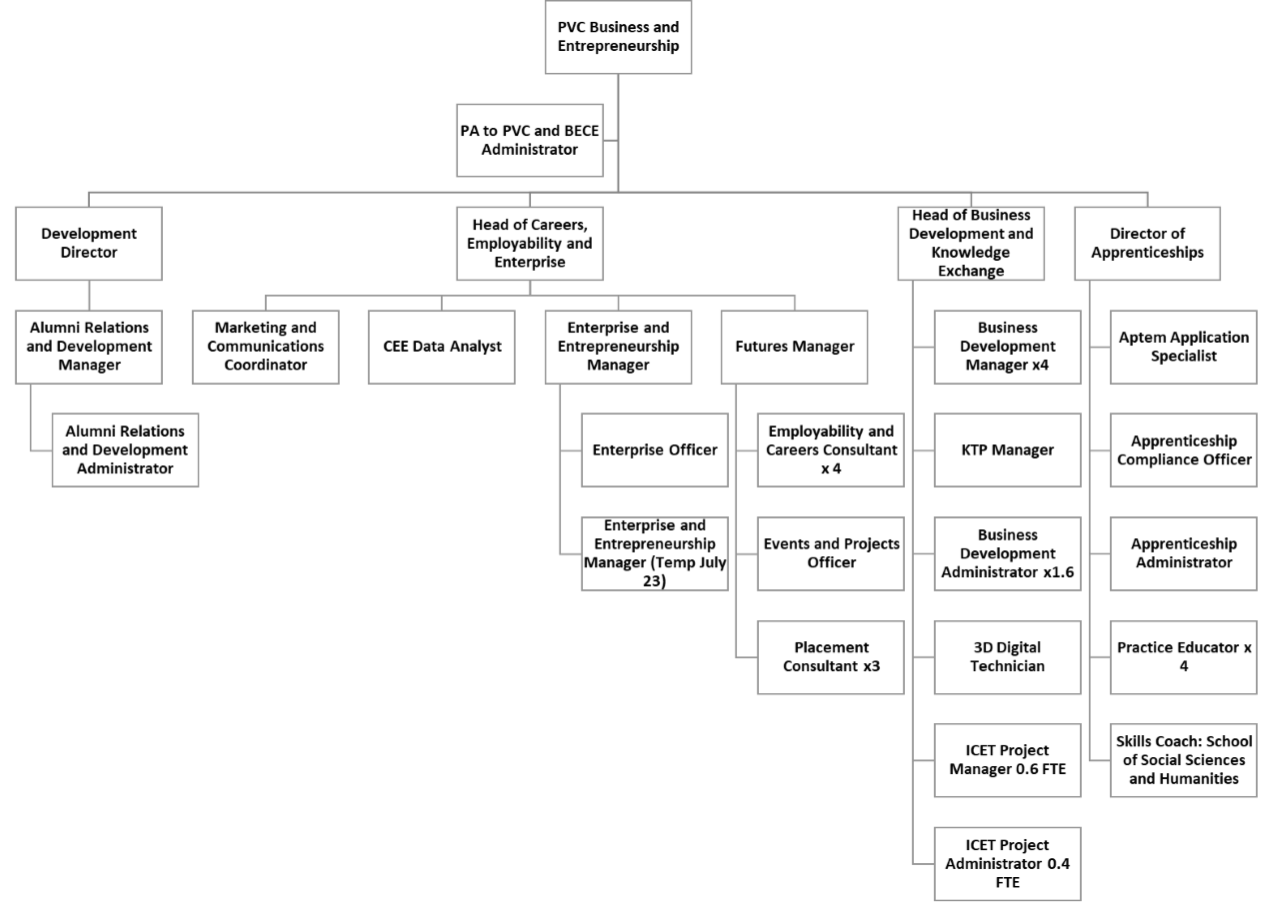
We were awarded a one-off grant from Research England in 2021-2022 to support our knowledge exchange activity and help with business’ Covid recovery. We used this to support the achievement of our strategy, piloting new initiatives with organisations.
Projects and Activity Delivered
We were one of seven university partners delivering the £6.5 Million Enabling Innovation- Research to Application (EIRA) project. Through this project we delivered 17 virtual internships with SMEs, 3 Innovation Voucher projects including a Covid Recovery project (consultancy and contract research), 1 Grant for Research & Development Project and I-Teams/Games Hub programmes.
We were a partner for the ERDF funded KEEP+ project. We played an active role on the steering group and delivered a research project with Suffolk Libraries. We provided partnership support to 3 other ERDF and ESF projects which provided business support and skills training to over 150 SMEs. Our ESF funded In Career, Education and Training (ICET) project commenced in 2021-22, developed in response to business intelligence; set to deliver leadership and digital skills training for >200 SMEs across Norfolk and Suffolk.
Internationally we were one of only 6 UK universities invited to form part of the new UK-MUC (UK and Malaysia University Collaboration) steering group and to deliver workshops on Innovation and Entrepreneurship.
We delivered a series of business workshops including Covid Recovery webinars, business breakfast and lunch and learn sessions, all under our ‘Together with Business’ programme.
Other projects delivered using regeneration funding are:
Suffolk Inclusive Growth Investment Fund (SIGIF) Entrepreneurs Forge project. A University delivered startup bootcamp for students, mini-MBA for creative industry businesses, and a new digital and creative suite including a green screen, high specification gaming laptops and VR headsets.
Community Renewal Fund ‘The Road to Net Zero’, a project which enabled innovative delivery of pilot programmes in advance of the launch of the UK Shared Prosperity Fund. Our Suffolk Sustainability Institute focused on supporting local businesses to create plans helping them achieve their sustainability goals.
British Council Malaysia Going Global Partnerships Catalyst project, our grant facilitated the delivery of innovation and entrepreneurship training to staff and students in Malaysia and Singapore, that has led to increased commercialisation of research and student / graduate business creation.
Royal Academy of Engineering Leaders in Innovation Fellowship Global Programme, a consortium led by the UoS, which delivered innovation and commercialisation training to over 60 participants from 8 different countries. Adopting a unique pedagogical approach encompassing online learning, virtual accelerator, in country delivery and a 2-week London residential.
Supporting our ambition of being a top 30 KTP provider by 2030 we delivered one KTP and had a further two approved in 2021-22.
Research England funding was used to target local growth and regeneration, including delivery of fully funded Internships, subsidised Innovation Vouchers and a R&D Facilities Fund – enabling organisations to access our expertise and technical facilities.
The funding was further used to embed a Challenge Lab model involving participants from charities, the public and private sector, PhD students and academics. The purpose was to engage external organisations in developing business projects aligned to our areas of distinctiveness and expertise. One lab resulted in a collaborative research project that secured further funding to address the negative impacts of long covid on sleep quality.
Developing the Innovation Ecosystem
Following its closure during lockdown, we took the opportunity to rethink our Innovation Centre model and brand. In January 2022 we created a partnership with Innovation Labs Group; an organisation offering coworking space in the County coupled with business support. We officially launched Innovation Labs – University of Suffolk (ILABS) in June 2022. ILABS provides a unique offer whereby members can work at any of the 4 locations and are allocated both a business mentor to provide external growth advice and a university Business Development Manager to help them with internal programmes such as research, consultancy, access to facilities, and internships.
Significant capital regeneration projects have been completed including:
The DigiTech Centre, a £9.6m research and engineering facility at BT’s Adastral Park. DigiTech is a Centre of Excellence in Digital Skills for Teaching & Learning, Research and Knowledge Exchange and is a unique partnership uniting our university with a world leading large company. The Smart House has been built close to DigiTech and is now the lynchpin for the work of the Suffolk Sustainability Institute, in research into “net zero” operations and our commitment as a university in this area.
The Health and Wellbeing building a £13m state-of-the-art facility and home to our unique Integrated Care Academy with partners such as Suffolk Mind and the Allied Health Partnership basing their organisations there.
The Hold – a £20m flagship new heritage facility for Suffolk located on the Ipswich campus. A partnership between Suffolk County Council, Suffolk Archives and the University of Suffolk, it has received funding from the National Lottery Heritage Fund, other national organisations, and local Suffolk heritage groups.
Evaluating Success
We are in constant dialogue with our regional SMEs and large employers who we view as key stakeholders, obtaining their input through events, collaborative projects and surveys. We always evaluate our programmes and events, using feedback to continuously improve our provision.
Aspect 3: Results
Regeneration Funded Projects
We have partnered with 9 other regional Universities and numerous public sector organisations on projects involving ERDF, ESF, Research England and other regional / governmental regeneration funding.
EIRA
The EIRA network led by the University of Essex delivered consultancy, innovation vouchers, student internships and R&D projects with SMEs to improve productivity and support scale up activities. The overall impact of this £6.5M project to the region was significant with resultant Gross Value Add of £8.3M. 281 regional businesses were engaged in knowledge exchange activity throughout the project and 32 graduate / student startup businesses were supported. The below infographic shows the high-level impact and the final evaluation report can be seen here.
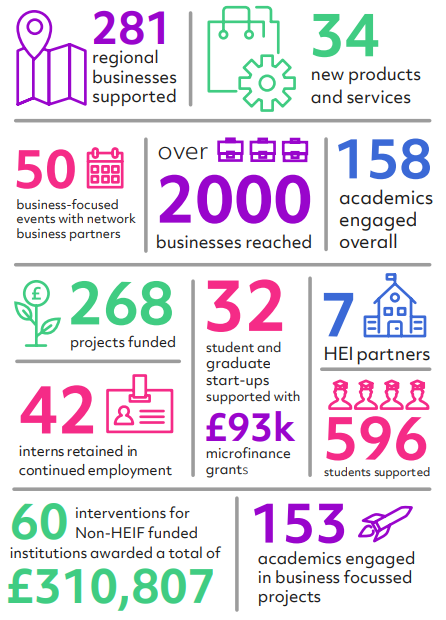
Entrepreneurs Forge (SIGIF)
SIGIF, created through allocations from Suffolk
Public Sector Leaders and NALEP has invested in 19 projects across
Suffolk since December 2020 including the Entrepreneurs Forge .
A recent evaluation of the programme has demonstrated a 1:4 return on
investment.
Our mini-MBA was delivered to 13 local SMEs who all created and
consequently implemented growth plans. The Programme has so far resulted
in the creation of a job, multiple collaborations and increased revenue
for all participants. Feedback was very positive:
“The benefits to the local small business community are immeasurable. Since the mini-MBA ended, I have collaborated with another member of the cohort for our companies to supply corporate gifts and have built a strong partnership with another, using their dietary needs app. A third participant is now working with me on some new creative designs.
At the beginning of the programme, I learned that a well-known local retailer had agreed to stock my products in their café. By the end of the programme, I had been able to persuade them to also stock the products in their retail outlet. Overall, the uptick to my business has resulted in me having to bring on a new employee for the first time!”
Charlotte Giddings, Brownie and the Bean
The student and alumni business startup bootcamp delivered a 9 module Bootcamp style programme, helping participants to develop a concept through a programme of workshops, activities and mentor support. It culminated in a pitch presentation to fellow students, mentors, coaches and local businesses, with a judging panel assessing the presentations. All participants were awarded a micro grant. One participant has created Anglia Creative a revenue-generating digital agency, is a member of ILABS (our coworking space) and has taken on 2 members of staff. An alumni business who took part went on to double their revenue over a one-month period thanks to the seed funding.
International Programmes
Through our 2 international programmes we have connected our expertise with 10 countries, supporting 98 academic staff and 375 students to date and being awarded new projects with participant institutions.
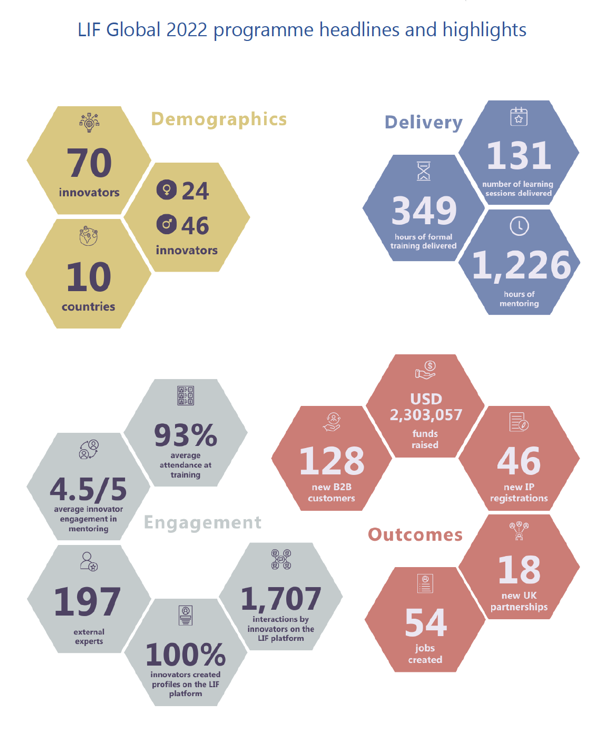
Other Initiatives
Apprenticeships – Following an Ofsted visit in 2021-22 we were rated Good for our provision.
ILABS – During the 2021-22 academic year (since we reopened the coworking space following lockdown) 18 paid members have used these facilities. Since partnering with Innovation Labs Group in January 2022 we been able to expand the current business network reach to 75 active members (including virtual memberships). 20 other ILABS members engaged with us over this short period. 3 ILABS members also took on a student intern.
KTPs – Increasing to 3 KTPs enabled us to move up 40 places in the KTP rankings, the highest increase of all universities delivering the Programme.
2019 – 2022 Outcomes and Impact:
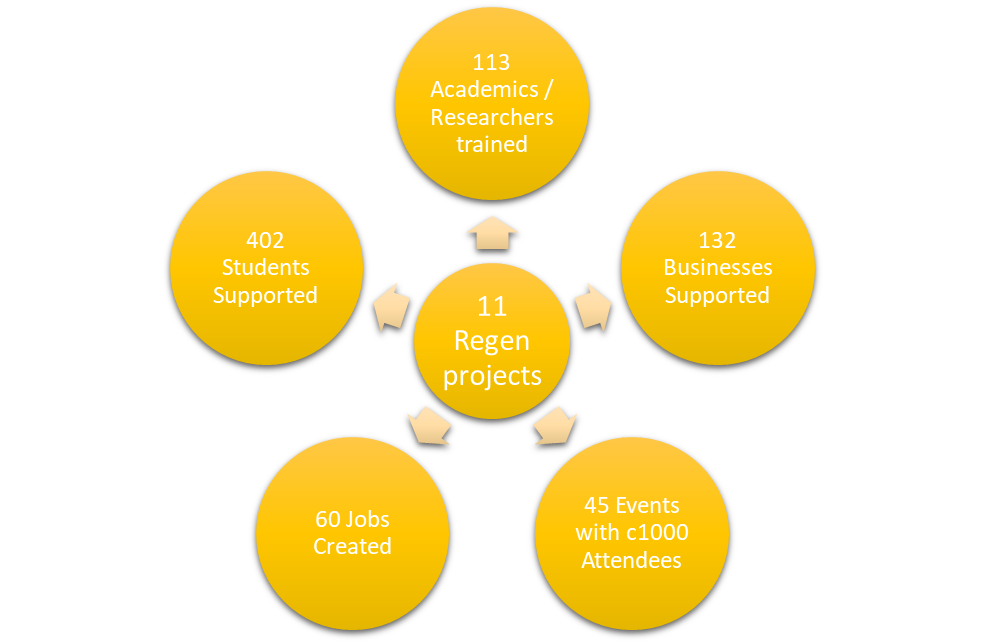
The below infographic shows the significant impact that the investment by the University in Business Development made in 2021-22:
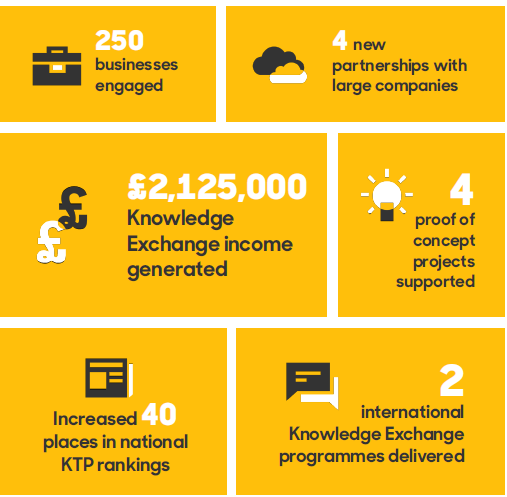
Our results and impact are communicated and celebrated via our membership of community and economic development groups, dissemination events, publications, our website and active social media channels for business engagement. Feedback and dialogue with our community is used to inform the development of future collaborative projects as we build our track record, reinvesting in those areas that deliver successful outcomes.
Public & Community Engagement
Summary of approach
The University of Suffolk promotes community engagement and knowledge exchange that aims to listen to and serve the needs of diverse communities. Integral to this, is our duty to empower, enrich and enhance the region's economic and social culture and equality of opportunity, preparing pathways for success for present and future generations.
Our external engagement is place-led and is about providing the right opportunities and fora to engage with our communities; listening, exchanging knowledge and acting on this to enrich the lives of individuals and organisations. To further demonstrate this, we have committed to signing a Civic University Agreement in 2023.
Our approach is further articulated through our Vision, Research and Business Engagement strategies and our Access and Participation Plan.
Aspect 1: Strategy
Our Approach
The university is committed to creating and sharing knowledge in collaboration with others and prioritises a data-informed, responsive and impactful approach to its networks of influence and support. This is evidenced as signatories of the Manifesto for Public Engagement.
Our community engagement can be grouped into three main organisational categories; business, economic development and third sector, cultural and community. The University is a patron of the Suffolk Chamber of Commerce and TechEast, and senior academic staff create meaningful and impactful connections in all spheres of public life including representatives on the CBI regional counsel, the Corporation Board of Suffolk New College, the regional LSIP, NALEP, Suffolk Growth Network and the regional Innovation Board. We work closely with charities and not-for-profits including Suffolk Mind, Healthwatch Suffolk and Aspire Black Suffolk. In addition, we collaborate with heritage and cultural stakeholders such as the National Trust, Suffolk Archives and the New Wolsey theatre, where we have board representation. We also regularly seek the perspective of our staff, students and alumni network.
Our relationships with these public bodies and organisations are strategic and outcome centric and drive our research and KE activity, informing and supporting our continuous improvement.

In 2018/19 we carried out public consultation events to enable us to present our university areas of distinctiveness and partnerships aligned with local plans for growth and regeneration to meet the needs and challenges in our communities. Research Institutes were subsequently established in the following areas:
Health and Wellbeing
Crime & Social Justice
Digital Futures
Sustainability
These consultations led to the creation of, and investment in, the Integrated Care Academy (ICA) and Digitech Centre and Smart House.
Resourcing our Public and Community Engagement Activity
In direct response to our engagement strategies and building our capabilities, we instated a Pro Vice-Chancellor of Business and Entrepreneurship role and recruited to a new Directorate which aligns to our Research Institutes, Schools and regional needs. This included Business Development Manager posts/Professors / Directors and other key staff to lead the Institutes and the ICA.
This significant new resource has allowed strategies to be refined, action plans with KPIs to be set and is providing a notable increase in the volume of external engagements in terms of greater impact, positive change and additional income.
We significantly developed leadership capacity in our academic Schools by creating the role of Associate Deans Research and Knowledge Exchange, with school-level strategic responsibility for Knowledge Exchange, research and external engagement. As a university not yet in receipt of HEIF all the posts outlined are directly funded.
Our Priorities and Goals
The University priorities for Public & Community Engagement are laid out in our University strategy and Vision and in our Business Engagement Careers and Employability (BECE) and our Access and Participation Plan (2020-2025) (APP) sub-strategies.
The APP identifies priorities for engaging with the community in order to increase access and participation in higher education. We specifically focus on activity with people of Black and Minority Ethnicities (BME) and people from geographical areas of economic and social deprivation. These groups have been identified through statistical analysis as being under-represented in higher education.
The BECE 5-year strategy aims to:
Continue to build and transform local productivity and targeted sectors, regenerating our local economy through skills development, business and job creation, work-based learning, student and graduate entrepreneurship and support for research and innovation.
By 2030 we strive to:
Transform and enhance the student and graduate experience; embedding employability, enterprise and entrepreneurship across all provision, thereby increasing employment outcomes and equality of opportunity and access.
We are committed to signing a Civic University Agreement by the end of 2023 to strengthen our external and public engagement strategy work.
Governance
Our stakeholder groups play an important role in our governance structures with representation from community organisations, staff and students on our main Board, our Equality, Diversity and Inclusion Committee, our Innovation and Engagement Board and at Student Voice forums.
These fora help set strategies and oversee agreed priority areas and projects in addition to reviewing business intelligence and other data. They also ensure objectives are set in the wider strategy and operating plan.
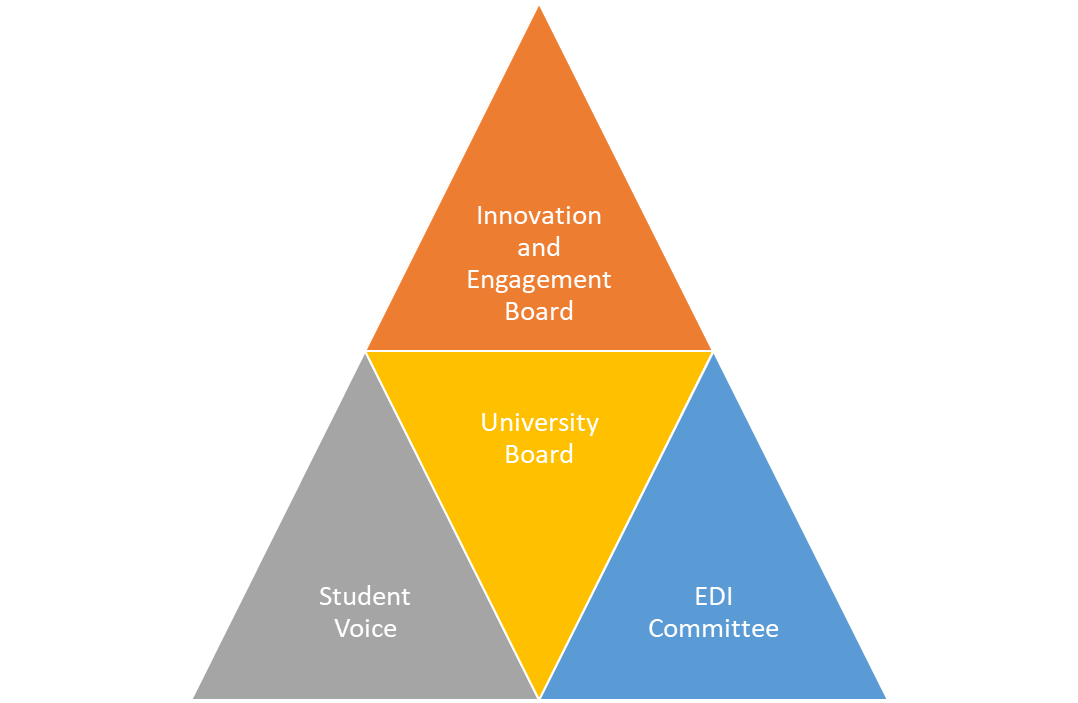
From an internal perspective, strategic governance is provided through the University Executive and Senior Leadership team. We feedback on and evaluate activity and achievement of objectives through our Knowledge Exchange Group. Minutes from this group are shared within the Research and Enterprise Committee as is a more detailed analysis of activity.
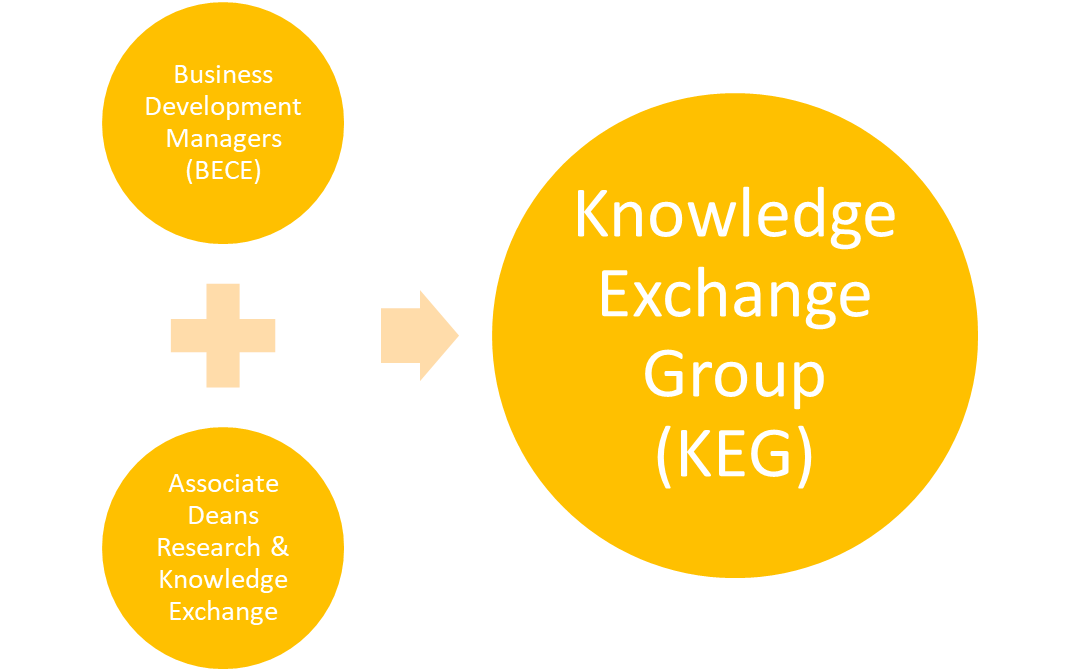
Aspect 2: Support
To deliver our strategy, teams are accountable under the leadership of the PVC Business and Entrepreneurship and PVC Research, both members of the University Executive. The BECE, Research Directorates and Suffolk Doctoral College, provide direct support to staff and students. Within each academic School, an Associate Dean for Research and Knowledge Exchange has leadership responsibility to enable, influence and drive forward the engagement agenda.
Course boards have representation from business/professional bodies informing the curriculum. Our Careers Enterprise and Employability team ensures the embedding of employability, enterprise and entrepreneurship in the curriculum. Investment in the BECE Directorate signified >200% growth between 2019-20 and 2021-22 in staff with responsibility for the engagement agenda.
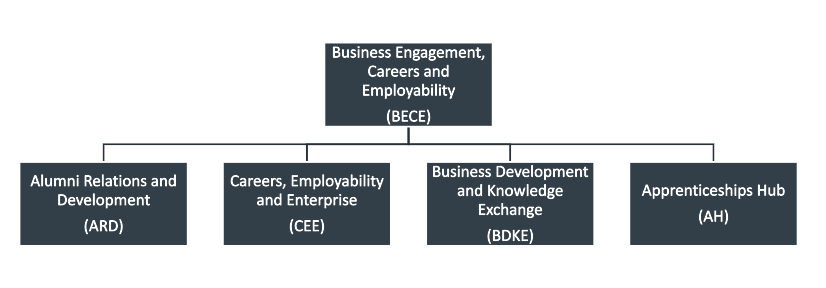
The appointment of Business Development Managers (BDMs) in 2020/21
who are aligned to both a School and Research Institute provided a new
support mechanism. Connecting industry / community and academia, they
work with ADs and Professors to develop KE / Engagement plans and
targets. BDMs make external introductions, support both pre and post
award and project manage collaborations. They create and present
opportunities within School / Institute meetings and identify training
needs. The BECE and Research Directorates and Suffolk Doctoral College
deliver regular training and workshop sessions related to external
engagement. .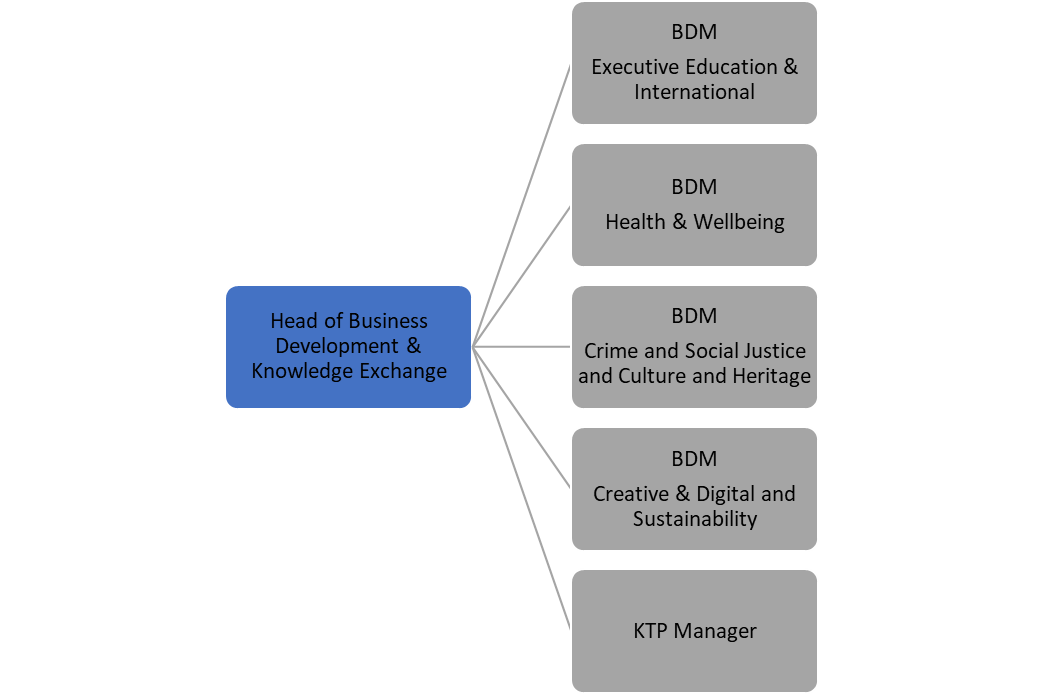
65% of academic staff engaged with the BECE Directorate within its inaugural year.
BECE uses social media to publicise these and engage our community further through accounts on LinkedIn, Twitter, and Instagram. BECE manages stakeholder relationships, using feedback from these to inform events, workshops and conferences, inviting academic staff to attend, present and network.
Research and Knowledge Exchange pathways exist for academic staff and engagement in connected activities forms part of the progression criteria. Evidence of community impact is sought alongside testimonials from partners and leaders in the relevant field. Successful engagement projects and achievements are shared in internal newsletters and our Annual Review, university-wide staff awards are held celebrating success and highlighting exemplar collaborations.
Aspect 3: Activity
The principal objective of our engagement activities is impact; widening access and participation in HE; activities and significant programmes delivered to support this are:
We deliver an annual teachers’ conference and fora which provide opportunities for training and knowledge sharing. Our student recruitment and outreach team has delivered workshops, training and support to organisations working with specific groups, including young people in care or with disabilities and refugees.
We deliver multiple campus-based workshops, summer schools and family awareness events, welcoming c1000 young people annually. In 2022 we partnered on the Suffolk Business Expo with other regional organisations. Through this we welcomed 60 school children from areas of deprivation to hear about alternative careers in education.
We have a significant presence at the Suffolk Show each year and engaged with c500 members of our community in 2022.
We work closely with ISCRE and Aspire Black Suffolk who deliver EDI training to our staff and the University has established a staff and student Anti-Racism Collective to drive forward inclusive teaching and learning. Staff are active members of community groups such as Ipswich Vision and these partnerships enable us to engage with our diverse communities, ensure our provision meets their needs and led to academic staff delivering a public conference on inclusivity in 2021.
We provide experts for partner-led events and podcasts, including the Festival of AI in Feb 21. This had representation from international businesses, showcasing collaborative opportunities for AI.
Our Open Lecture Series showcases academic excellence. We ran 19 Open Lectures with over 1000 attendees.
Projects
We were a partner delivering EIRA a project transforming the regional business landscape and increasing engagements. We delivered 17 internships with SMEs, 4 contract research / consultancy projects and student enterprise programmes. The programme matured our KE offer and provided significant economic impact.
Launched in 2021, the ICA, is a first-of-its-kind partnership between the University, Integrated Care System (ICS), Suffolk County Council, Healthwatch Suffolk and others from the voluntary and community sector. The ICA supports the changing needs of health and social care; sustaining and developing joined-up services for the benefit of our population. The ICA delivered 22 co-produced online wide-ranging events in its Foundation Week with 800 participants.
Our Health and Wellbeing research institute officially launched in 2022 (80 attendees) and led our first Challenge Lab (16 participants). Our Insitute of Crime and Social Justice delivered a conference showcasing its research under the Trauma, Injustice, Violence and Abuse theme (85 attendees).
We began hosting research networks including the Violence Against Women and Girls Research Network and the Domestic Abuse Research Network (DARNet) totally over 850 members. Since launching in 2019, DARNet has partnered with organisations, researchers, practitioners, and survivors across the UK, including Drive, HALO Project and H.O.P.E Training & Consultancy.
In 2022 we established a free Legal Advice Centre for the community.
In 2021-22 we ran Entrepreneurs Forge, a SIGIF project, delivering a student startup bootcamp and mini-MBA for existing organisations. This engaged 13 SMEs and created 2 student startups. We also purchased digital and creative technologies for community use. A recent evaluation of the programme has demonstrated a 1:4 ROI.
BECE delivered 45 events engaging c1000 members of the public in topics related to growth and innovation. Our ESF supported International Women’s Day celebration was our first post-lockdown event. It received strong acclaim, inspiring all 150 attendees and raising aspirations. We ran a Road to Net Zero Symposium event on World Earth Day in 2022 as part of a Community Renewal Fund project, with 63 physical attendees and more joining online.
In 2022 we established an innovative partnership with Innovation Labs Group. This helped to relaunch our coworking space post-lockdown and offer a USP. Innovation Labs University of Suffolk (ILABS) is one of 4 partnership sites offering a business programme and advice on accessing university resources and expertise. We held a launch event doubling-up as a business support expo for 120 delegates with 9 regional business support providers attending.
Capital Projects
2019 - The Digitech Centre, a £9.8 million research and engineering knowledge exchange facility at BT’s Adastral Park,
2020 - The Hold, a £20m flagship heritage community facility on campus in partnership with Suffolk County Council and Suffolk Archives
2022 –The Health and Wellbeing building a £13m state-of-the-art facility and home to the ICA with partners such as Suffolk Mind and Allied Health situating their organisations there.
Aspect 4: Enhancing practice
Our approach
We have not deployed an institution-wide approach to evaluating our public engagement activity due to its breadth and not considering a ‘one-size fits all’ method to be the most beneficial. In addition, we have had to meet specific funder evaluation criteria. That said, both the BECE and Research Directorates have developed evaluation forms for events and training workshops that include standardised components alongside programme / funder specific context and content. Furthermore, a standardised case study template has been created for collaborators working with us on regeneration and development programmes, consultancy and contract research projects. We use this to evaluate economic impact and learn lessons to implement in future projects:
Initial problem to be solved
Academic / student expertise accessed
What the project delivered
Any unexpected outcomes / pivots
Impact on the collaborator
Next steps
Our support
All academics, researchers and PhD students are asked to consider and include their dissemination plans in their research and KE proposals, along with associated costs. BDMs and Research Directorate staff provide support to academic staff when considering evaluation and the best model on a case-by-case basis such as questionnaires, focus groups, papers or events and conferences. There is a strong academic peer support network and research mentoring provided. Additionally, a REF workshop was delivered to help staff better understand impact and how to embed evaluation from the planning phase.
Through our patronage / membership on important economic development-centric organisations and networks including NALEP, the Innovation Board, TechEast, Suffolk Chamber of Commerce, Digital Tech Council, Sector Skills Groups, Ipswich Vision and Suffolk Growth Programme Board, we are key stakeholders in the development of local plans. We continuously share progress updates within these fora and receive information and feedback to develop projects that are meaningful and impactful to our communities.
Our community is learning and progressing together with a shared purpose to transform lives. This journey has been strengthened by the year- on -year enhanced institutional investment in the support and necessary infrastructure to deliver on our ambitions.
Aspect 5: Building on success
The University holds a Research & Enterprise Committee (REC) chaired by our DVC, twice yearly, which receives papers, evaluations and updates from the BECE and Research Directorates, the Research Institutes and ICA, Schools and the Suffolk Doctoral College (the teams accountable for our engagement activity).
Other governance groups have been established that feed into the REC. These are a combination of internal and external, meeting monthly, bi-monthly or quarterly to review progress, make recommendations on future activity and support promotion and engagement. The Knowledge Exchange and Research Management Groups (KEG and RMG) provide internal perspectives, while the Innovation & Engagement Board (IEB) and project specific steering groups (for both research and KE initiatives) provide external governance and monitoring. IEB and steering groups are made up of key stakeholders including business network representatives, large employers, regional economic development stakeholders, third sector organisations and where relevant SU representatives.
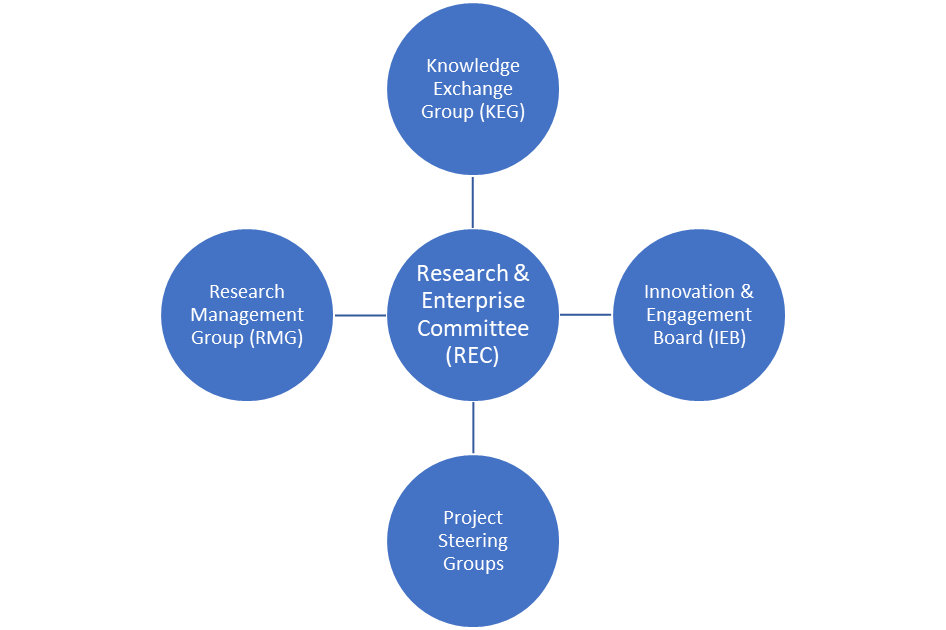
Feedback from these groups and from our engagement with wider community and economic development groups and businesses directly, is used to refine projects and the focus of our areas of distinctiveness. This helps inform the regular review of strategies and business plans. An example of this is where we conducted business surveys into regional business skills needs to inform an ESF programme.
KPIs are set within the planning round and our key institutional strategies and are reviewed quarterly.
The University holds an Annual Court to communicate to key stakeholder business and community groups, the outcomes and impact of our strategic direction and key knowledge exchange projects. Annual reviews and a regular University newsletter communicate key outcomes to staff, students and stakeholders. A Business@Suffolk newsletter is sent to our subscribers to inform businesses and external organisations of events and activities for engagement as well as regular social media posts, providing project updates, blogs and links to reports.
We collate customer feedback from our events, inviting attendees to make suggestions for future events or potential improvements. These are evaluated and where appropriate actioned so that we are responding to direct demand.
A lot of our activity results in case studies, news stories, videos, reports, conferences and showcase events all of which are accessible to the public.
Note You are currently viewing the latest version of this narrative statement. View the previous version as published in previous iterations of the KEF (KEF1 and KEF2)